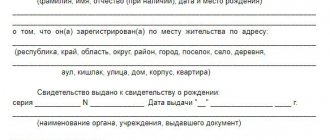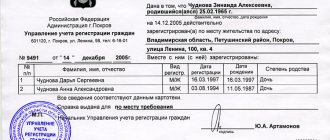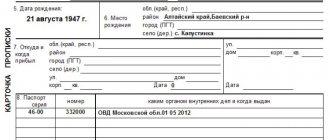Denis Volnov, lawyer and managing partner of Sdelky.ru, answers:
There are two options for registration in residential premises - registration at the place of stay (temporary) and registration at the place of residence (permanent). Temporary registration is made for a period of up to five years. If a temporary registration is established, you will be issued a certificate indicating the validity period of the registration. At the end of the specified period, registration is automatically canceled. Permanent registration is carried out in the form of a stamp in the passport and is unlimited. Therefore, for a certain period (five years) you can register your son and his wife only at the place of residence, but this procedure does not require a stamp in the passport.
How to register permanently and how to check out of the apartment?
How long can you live without registration?
What is a place of residence?
Everyone needs a roof over their head, warmth and comfort. We all live in premises designated for this purpose as an owner, tenant, or for other reasons.
Place of residence is a residential property where a citizen lives permanently or primarily. It could be:
- his own home;
- premises used under a lease (sublease) agreement or on other grounds provided for by the laws of the Russian Federation.
As a rule, this is an apartment or residential building at the address of which registration at the place of residence is carried out. The fact that a citizen is registered there can be judged by the corresponding stamp in the passport.
When changing place of residence (for example, in connection with moving to another locality), a citizen is obliged to apply for registration at the new address within seven days from the date of arrival. This norm is enshrined in Art. 16 Decree of the Government of the Russian Federation of July 17, 1995 N 713.
Registration at the place of residence is carried out on the basis of:
- the applicant's identity documents;
- a document giving the right to move into a residential premises (for example, a certificate of ownership);
- statements in the prescribed form.
If the person being registered is not the owner of the residential premises, consent will be required from the citizen who has the right of ownership.
Registration of a child at the place of residence of one of the parents
The director of the secondary real estate office of Est-a-Tet, Yulia Dymova, answers:
There is a long-term temporary registration, which is provided in the form of a free use agreement. It is also worth remembering that there are several registration options - at the place of residence and at the place of stay. Registration at the place of residence requires a stamp in the passport, but is associated with difficulties when deregistering persons registered in the apartment. When registering at the place of residence, such difficulties will not arise, but there will be no stamp in the passport.
Registered a foreigner in the apartment for 3 years. Will there be problems upon discharge?
Do residents with temporary registration have to pay for utilities?
Legislative regulation
The concept of place of residence is given in Art. 2 of the Law of June 25, 1993 No. 5242-1. Before it came into force, the term “registration” was used, which was permanent and temporary. By analogy, registration at the place of residence is permanent.
The main purpose of registration of citizens on the territory of Russia is to provide them with the opportunity to move freely, while unhindered receipt of government services. Thus, the rights, freedoms and legitimate interests of every citizen of the Russian Federation are respected. For example, the possibility:
- employment;
- transfer of pensions and other social payments;
- receiving medical care;
- registering a child in a preschool or school institution;
- receiving social guarantees, etc.
Private practicing lawyer Victoria Suvorova (Pyatigorsk) answers:
You don't have to register anyone in the apartment. This does not affect ownership. You can register your son with both permanent and temporary registration, since he is a citizen of Russia. The period of temporary registration for Russian citizens ranges from 6 months to 5 years. For your daughter-in-law, you will only be able to obtain temporary registration for the period of her stay in Russia. Here you need to look at what rights it is in the Russian Federation and for how long. Depending on the subject, foreigners have their own rules. Typically, temporary registration of a foreigner is made for no more than a year and then extended.
Can I kick my husband out of the apartment without his knowledge?
Is it possible to register in an apartment owned by a foreigner?
How is it different from the place of actual residence?
From the legislative side, a citizen’s place of residence is the residential premises where he is registered. This is confirmed by a stamp in the passport. In fact, he may live in another room. If it is located within the same region as the place of permanent registration, then there is no need to issue temporary registration.
In the case where a citizen actually resides in another region for a period of more than 90 days, a certificate of temporary “registration” will be required.
For example, let's take the case of a young married couple. They do not have their own housing, so they left the addresses of their parents’ apartments as permanent registration. But in fact, they rent housing located in the same area where they live.
Temporary registration is not required there; it is not contrary to the law. When applying for government services (for example, to enroll a child in a preschool), this can be done at the place of actual residence. Initially, the interests of children according to their “registration” will be taken into account, and then, if there are free places, I can take those actually living in the area.
Place of registration and place of actual residence: key differences
Another key feature that shows the difference between the place of stay and the place of actual residence is the type of residential property. They “stay” temporarily in hotels, boarding houses, health centers and other similar institutions. A hotel cannot become a place of long-term stay, and you cannot obtain permanent registration here. But they “live” precisely in residential premises (that’s why they are called that). Here it is possible to stay for a long time and register as a permanent resident (if there are grounds).
The address where a person actually lives may coincide with the place of both permanent and temporary registration. The latter is possible, for example, in cases where citizens are “registered” in one city and work or study in another for a long period of time. It is the second address that is considered the place of actual residence.
What is your actual residential address?
The place of actual residence is the housing in which a person stays temporarily. Under these conditions, a person can only have temporary registration or no registration at all. The actual residence of citizens is confirmed by documents, for example, a lease agreement.
- type of object - for the first it is, for example, a hotel or an inn, and the place of permanent residence is a house or apartment;
- temporary indicators - short-term and long-term accommodation;
- documentary evidence - reference data or a stamp in the passport.
What is your actual residential address?
Often the actual residential address and the registered address at the place of residence differ. It is very important to understand how the concepts under consideration differ and how they are similar. What is it - the actual address of residence and the address of registration, how the above terms are characterized, what are their features - we will look at all this in the article. This is necessary in order to avoid misunderstandings in the future, since citizens face an administrative fine for violating registration rules.
- type of object - for the first it is, for example, a hotel or an inn, and the place of permanent residence is a house or apartment;
- temporary indicators - short-term and long-term accommodation;
- documentary evidence - reference data or a stamp in the passport.
We recommend reading: How many square meters should there be per person?
Differences between place of stay and actual residence, what you need to know in 2021
- a place where a person lives permanently or most of the time;
- residential premises (house, apartment, office space, dormitory, boarding school, etc.), where the citizen is the owner, under a lease agreement or on any other basis;
- the place where the Russian is registered in accordance with the Registration Rules of June 17, 1995.
- temporary presence in a residential premises, usually located in another city;
- the need for temporary registration 3 months after moving in;
- temporary registration is valid for one year, after which it must be reissued;
- the property owner has the right to evict a citizen at any time;
- the ability to use government services at the place of stay only for the duration of the temporary registration;
- no need to pay utilities;
- a certificate of temporary registration is issued in the form of an insert in the passport.
We recommend reading: Tax on the Sale of an Apartment Owned for Less than 3 Years
Place of residence and place of registration - what are the differences?
So, a certain place in which a person is temporarily located for a period of time (less than 3 months without registration or more than 3 months with registration) is called the place of stay. This could be a hotel, a sanatorium-resort institution, a rented apartment, a recreation center, etc. Employees of enterprises such as hotels register visitors themselves, and in the case of rental housing, a person registers himself.
We recommend reading: What is the tax on donating an apartment?
Current Russian legislation allows citizens to move around the country as they please, however, there is a procedure according to which living outside a permanent place of residence is allowed for no more than 90 days - otherwise, they will have to contact the authorized bodies to obtain temporary registration at the place of residence.
Rules for registration of citizens of the Russian Federation at the place of stay and place of residence
Temporary registration should not only be carried out in private premises. If a citizen plans to stay in a hotel or recreation center for more than 3 months, then a temporary registration should also be issued for him. The administration of the institution where the vacationer is staying is responsible for these conditions.
You cannot register at your place of residence at your own request. Registration can be temporary, and the need for it arises only if a person intends to stay in housing for more than three months. To do this, it is necessary to provide serious reasons, which can be lease or rental agreements.
Place of stay and place of actual residence - differences
Registration at the address of a residential property that is a place of temporary residence of a citizen can be valid for up to 5 years. After this, it may be extended. The specific registration dates are chosen by the owner of the premises. They may also be determined by the period of validity of the rental agreement.
In the legislation of the Russian Federation, a place of residence means a certain residential facility in which a person is temporarily located - a hotel, a tourist center, a rented apartment in another city. In some cases, a citizen is required to register there. For example, this must be done if he is in a populated area for more than 90 days.










